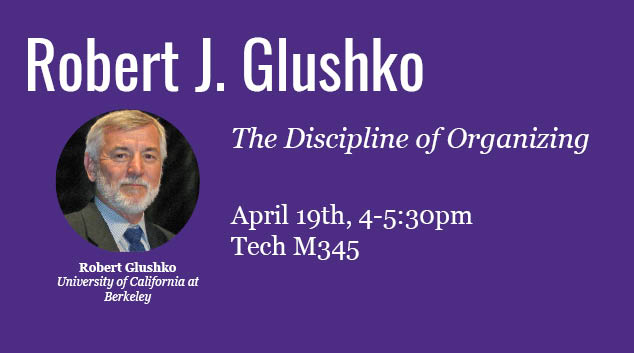Dr. Robert Glushko, 4:00pm April 19th, 2017

School of Information
University of California at Berkeley
Wednesday, April 19th
Tech M345
4:00pm
Reception to Follow
The Discipline of Organizing
Every “Organizing System” involves a collection of resources, and we can treat physical things, digital things, information about such things, and even the people who use them as resources to create a more abstract and generative discipline of organizing. Every Organizing System involves a choice of properties or principles used to describe and arrange the resources, and ways of supporting interactions with the resources. By comparing and contrasting how these activities take place in different contexts and domains, we can identify patterns of organizing and see that Organizing Systems often follow a common life cycle.
The idea that a new discipline of organizing emerges from the intersection of library and information science, computer science, business, law, cognitive science, and other disciplines that have more specific concepts and methods for organizing led to a collaboratively-authored book whose design embodies this intellectual architecture. The book's content is organized as a transdisciplinary core with supplemental content identified by discipline, creating a logical "family of books" with thousands of siblings, any of which potentially could be instantiated in print or as an ebook. This capability for disciplinary personalization poses interesting (not yet fully answered) questions about reading and learning experiences.
But how does “organizing” relate to the rapidly emerging (and heavily hyped) areas of data science, machine learning, and predictive analytics? There are many bold predictions that these emerging fields will fundamentally change the world and make much of how information science and cognitive science think of “organizing” and “sensemaking” irrelevant – especially unsupervised learning techniques that don’t depend on any existing identification, description, or classification of resources. I strongly disagree, and will argue that data science is complementary to the discipline of organizing by situating both in a larger context of human activity that includes sensemaking and science